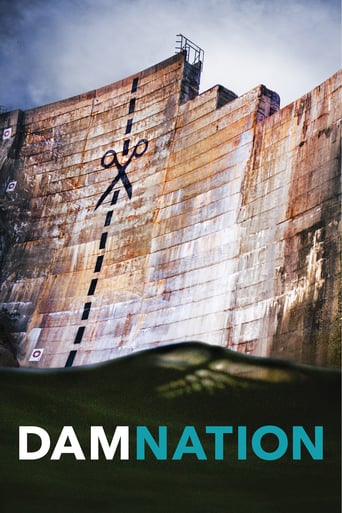DamNation (2014)
This powerful film odyssey across America explores the sea change in national attitude from pride in big dams as engineering wonders to the growing awareness that our own future is bound to the life and health of our rivers.
Watch Trailer
Cast
Reviews
Such a frustrating disappointment
Beautiful, moving film.
The story-telling is good with flashbacks.The film is both funny and heartbreaking. You smile in a scene and get a soulcrushing revelation in the next.
It's a movie as timely as it is provocative and amazingly, for much of its running time, it is weirdly funny.
This is a film that will delight folks who think that technology is ruining the world. Its basic premise seems to be that ALL dams are bad. And much of the time this documentary talks about how awful dams are. The film talks about how they kill people when they burst but most importantly they impede salmon from breeding. While there have been a few dam breaks (mostly a long time ago and talking about the Johnstown Flood of 1889 seemed WEIRD and disingenuous since it IS the 21st century) and it's undoubtedly true native salmon populations have been decimated, the film rarely explores the POSITIVES about dams or discusses whether SOME mitigating projects actually work (such as salmon hatcheries in Alaska). While a few folks are shown with contrasting views, mostly they seem like idiots and are overruled by the all-knowing narrator in the movie. The film also doesn't interview the right people--people with informed and scientific facts instead of emotions. I would have loved to have heard from biologists, geologists and the like--but mostly you have Native Americans, park rangers and activists--all people you might want to include ALONG WITH EXPERTS-- not in place of them.The bottom line is that "DamNation" is clearly a film with a preconceived notion and it does all it can to support it and ignore things to the contrary (such as cheap and clean energy, jobs, increased farm production, etc.). It's a shame in a way, as technically this is a nice looking documentary. The graphics are great and the look of the film is lovely--hence why I give the film a 3 overall. For content, I would only give it a 1.All of this is very sad, as I am a guy who probably would be towards the middle of this debate. I am an avid fisherman and feel we need to think and re-think many of the dam projects and other projects that negatively impact the environment. But, I think everything should be case by case. Dams are neither always bad or always good- -and anyone wanting to really learn more about this debate would be better advised to read some books instead.
I'm a bit of a hybrid Republican. I grew up in California and was a child in the late 1960's and early 70's which gave me a strong appreciation for nature. Later, the business influence of my family and where I ended up career-wise had me understand how business operates. However, it never impacted my love of nature and its wonders. This documentary exposed a lot of critical information we don't normally receive from the mainstream (no pun intended) media. I had no idea we have so many dams in the USA! To see that some were made close to each other along the same waterway was shocking! As I saw the map of their placement all that ran through my mind was, "What where the planners thinking?!" I see this as a business opportunity for more windmills to be placed in desert areas where little life exists and minimal environmental impact is realized. Then, every single dam that does not include flood control and fish passages (https://www.nwcouncil.org/history/FishPassage) in its operations can be on the chopping block for closure and tear down. As a nation, we went way too far. I challenge the documentary team to post a list of dams they find acceptable that maintain human life still function well with nature. From my perception, not all dams are bad but after watching this, I know now that many should have never been built. For those who care about this subject, there are several times when you will get emotional. When you will understand the beauty and ecology of an area that ended up devastated after a dams was built, it can hit you in the gut. You will see native cultures that were damaged by the negative impact on the land which they so passionately love and shared with nature. The emotional loss is like losing a loved one. I'm grateful this documentary was made and showed a passion for sharing information without being pushy about it. If you end up 50% as passionate as the documentary team, you will be able to make a difference.
DamNation really surprised me - very fascinating, very compelling, and I didn't go in already converted. An excellent film - hats off to Travis Rummel and Ben Knight and also to Yvon Chouinard. The film is a real eye-opener. It avoids didactic, but makes you feel the power and importance of rivers to America. Who knew we have 70,000 dams in the US, most doing nothing useful at this point? I want everyone to see this film - it is really good, really exciting and really important. It is hard to make fish truly sympathetic, they are cold, scaly and expressionless. But this film has me convinced that anything able to swim 900 miles deserve our support, and the removal of a few dams doing nothing useful at this point.
Damnation was very well-received in its world premiere at Austin's SXSW Film Festival. The film is a thoughtful, well-supported argument to significantly reduce the thousands of damns in the U.S. This issue has been almost invisible as part of the wider environmental debate and certainly deserves more discussion. I was surprised that this movement has begun to have some success despite being quite low-profile in much of the media. Some parts of the film seemed a little overly idealistic in terms of the argument that preservation of salmon runs and fish species could justify the elimination valuable hydroelectric resources. The overall argument about preserving natural beauty also seemed a little unrealistic in terms of adaptation to modernity. Still the filmmakers made a solid case that some damns had outlived their usefulness. The historical part of the film was very interesting since it is an economic transformation that is rarely discussed. The interviews and the photography were really well-done and they managed to throw in some interesting characters and some humor. The film had far more depth than the other film about river preservation, Yakona, which also ran at SXSW. While similar politically, the two films were dramatically different in terms of style. Yakona was a wordless meditation without any real substance. . Damnation was well-filmed very informative and detailed and, in the end, makes a rational case rather than emotional one for its point-of-view. I hope the film gets some distribution, because it is an issue that deserves more serious political discussion.



